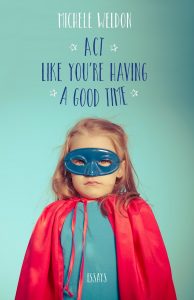Even Your Memoir Is Not All About You By Michele Weldon
 Refrain from the use of “I.”
Refrain from the use of “I.”
That writing advice may seem hypocritical coming from the author of two memoirs and a new book of personal essays, but even in the most intimate episodes of baring your soul in your writing, readers do not need the constant reminder that it is you writing about yourself.
They are actually trying to be sure it is about themselves.
Because you are writing about your life with your byline, readers assume that you are the narrator, conjuring up each scene, section of dialogue and description. So literally writing, “I saw,” “she said to me,” “I said,” or “I remembered,” becomes as tedious a reminder of your presence as the person who has cornered you with their opinions about what is wrong with the media.
Your presence is implied. Of course, you have to write “I” every now and then for clarity, but repeatedly starting sentences or paragraphs with your pronoun declaration is unnecessary.
Since my first memoir, “I Closed My Eyes,” was published in 1999, I have sold more than 100,000 copies of that book in seven languages, was a guest on “The Oprah Winfrey Show” to discuss the book, and sold tens of thousands more of four subsequent books including a book on writing personal stories, Writing to Save Your Life, and a second memoir, Escape Points. I am hoping to sell a few copies of my sixth book, Act Like You’re Having A Good Time.
Writing first person commentary, memoirs and essays for love and money, my work pays the mortgage and the gas bill, occasional trips to Whole Foods for the blackened chicken salad that is about $30 for a container, and shoes on sale at DSW. In four decades of writing I have learned a few things about why my work matters not just to me, but to others.
You may think your writing personal stories it is all about you, but it is about the reader as well. That is why there is a tired cliché, “The personal is universal.”
Zora Neale Hurston said, “There is no agony like bearing an untold story inside of you.”
So many of us are living confined lives of working from home, sheltering in place, eliminating trips to museums, coffee shops, bars, favorite restaurants, beaches, even family parties and trips with friends. Our worlds have shrunk and save the mandatory zoom calls for work conferences and webinars, there may be a station wagon full of people you encounter in real life. But our words are larger than our lives.
Now might be a good time to start writing in the first person in true, authentic, luminous stories about your life. Create stories that people want to read because of the honest vulnerability you reveal.
Be certain of your motivation to write, make sure the need is not to be malicious, because if that is the motivation, it will be hollow.
Make sure what you are writing is not simply a chronological regurgitation of events. Brushing your teeth is not so interesting a topic. Unless from that prompt, you begin writing about the woodsy smell of bourbon on your uncle’s breath, or the first grade teacher whose teeth were the color of sand. Begin with your memory and expand into a kaleidoscope of imagery and memories tied back to the simple task of brushing your teeth as a metaphor for much more.
A desire to profoundly articulate a meaningful experience, applying the techniques of literature to a life moment or phase, that is what readers connect to. Even when the specifics are not what they know firsthand, the feelings and emotions you conjure certainly are.
Write in a tone, voice and style that allows your personality to venture onto the page. Write the way you speak. We all know when we receive a card or email that is insincere.. Try to avoid that kind of insincerity in your writing.
Your genius is in the details but also in the connections you make. Highly creative people have the ability to take completely disparate ideas and events, find the commonality and connect them.
Compare an event or scene to something else it seems like—a swath of clouds to a cannon explosion; a neighbor to a chipmunk. What does a situation feel like, look like, smell like, sound like, remind you of?
If your writing has a clear purpose of offering someone the chance to discover a feeling, a moment, then you are well on your way to good writing.
Ray Bradbury explains writing as, “How to feel your way toward something honest, hidden under the trapdoor on the top of your skull.”
Remember you are writing to be read, making a sacred offering into the world of ideas; this is a blessed transaction between you and the reader. Do not violate the trust.
Authentic writing comes from not just telling the story but telling the whole story. We all know when a friend is holding something back—perhaps afraid of how it will be received. Write the way it really is. Be proud, but also be humble.
Mary Karr reminds us in The Art of Memoir, “But I still feel awe for us—yes, for the masters who wrought lasting beauty from their hard lives, but for the rest of us, too, for the great courage all of us show in trying to write some truth from the godawful mess of a single life. To bring oneself to others makes the whole planet less lonely.”
—
Michele Weldon is an author, journalist, emerita faculty at Northwestern University, senior leader at The OpEd Project. Her latest book, Act Like You’re Having A Good Time, is out in September.
@micheleweldon www.micheleweldon.com https://www.facebook.com/michele.weldon.35
ACT LIKE YOU’RE HAVING A GOOD TIME
 In this honest and tender collection of essays, award-winning memoirist Michele Weldon asks what it means to be a mature woman seeking a life of purpose and meaning through work, family, and relationships. Facing ageism and invisibility within popular culture, Weldon examines the effects of raising children, striving for applause, failing expectations, forming new friendships, reconciling lost dreams, and restoring one’s faith. With sincerity and humor, she unwraps family traditions, painting classes, lap swimming, dress codes, and career disappointments. She addresses white privilege and her evolving understanding of racism. And she asks crucial questions about mortality, finding connection in writing and stories.
In this honest and tender collection of essays, award-winning memoirist Michele Weldon asks what it means to be a mature woman seeking a life of purpose and meaning through work, family, and relationships. Facing ageism and invisibility within popular culture, Weldon examines the effects of raising children, striving for applause, failing expectations, forming new friendships, reconciling lost dreams, and restoring one’s faith. With sincerity and humor, she unwraps family traditions, painting classes, lap swimming, dress codes, and career disappointments. She addresses white privilege and her evolving understanding of racism. And she asks crucial questions about mortality, finding connection in writing and stories.
Frank, eloquent, and daring, Weldon dissects the intricacies of life, journeying toward self-discovery as a mother, daughter, sister, and friend. Readers of any age or gender will recognize the universal experience of learning to accept oneself and asking essential questions—even if there are no easy answers.
BUY HERE
Category: How To and Tips




























